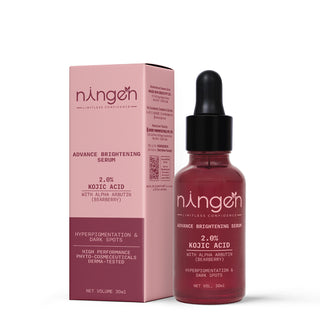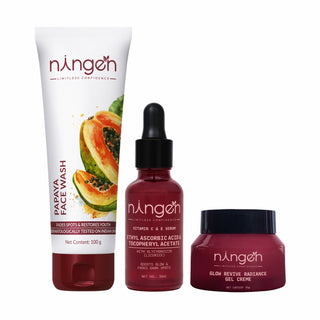सही फेस वॉश चुनना कभी-कभी काफी कन्फ्यूजिंग लग सकता है। इतनी सारी ऑप्शन्स हैं मार्केट में, कि समझ नहीं आता कहां से शुरू करें। लेकिन यह एक सीक्रेट है: सही फेस वॉश आपके स्किनकेयर रूटीन का पहला और सबसे जरूरी स्टेप है। चाहे आप ऑइली स्किन से परेशान हैं, ड्रायनेस से जूझ रहे हैं, या अपनी स्किन को बैलेंस्ड रखना चाहते हैं, सही क्लेन्ज़र से आपकी स्किन हेल्दी और ग्लोइंग बन सकती है। इस गाइड में, हम आपको मदद करेंगे यह समझने में कि कैसे आप अपने स्किन टाइप के लिए बेस्ट फेस वॉश चुन सकते हैं। तो चलिए, जानें आपकी स्किन के लिए क्या है बेस्ट मैच !
In This Article;
- सही फेस वॉश कैसे चुनें?
- त्वचा के प्रकार के अनुसार फेस वॉश:
- सही क्लीनज़र कैसे चुनें: त्वचा के प्रकार के अनुसार गाइड
- त्वचा के प्रकार के अनुसार मुख्य सामग्री
- नया फेस वॉश उपयोग करने से पहले पैच टेस्ट करें
- निष्कर्ष
- सामान्य प्रश्न
सही फेस वॉश कैसे चुनें?
फेस वॉश चुनते समय यह जरूरी है कि आपकी त्वचा के प्रकार और जरूरतों को ध्यान में रखें। सही फेस वॉश से आपकी त्वचा साफ, मुलायम और हेल्दी रहती है। आइए जानें, कैसे चुनें सही फेस वॉश।
1. त्वचा का प्रकार
अपनी त्वचा का प्रकार पहचानें - तेलीय(ऑयली स्किन ), सूखी (ड्राई स्किन ), संयोजन (मिक्स स्किन ), संवेदनशील (सेंसटिव स्किन) या सामान्य (नार्मल स्किन)। इससे आपको सही फेस वॉश चुनने में मदद मिलेगी।
2. सामग्री
आपकी त्वचा के अनुसार सामग्री का चयन करें। सूखी त्वचा के लिए हाइड्रेटिंग सामग्री जैसे हायल्यूरोनिक एसिड, और एक्ने के लिए सलिसिलिक एसिड बेहतर हैं।
3. pH बैलेंस
ऐसा फेस वॉश चुनें जो आपकी त्वचा के pH को बनाए रखे, ताकि त्वचा ड्राई या सेंसिटिव न हो।
4. संरचना
फेस वॉश का चुनाव उसकी संरचना के हिसाब से करें - जैसे जेल, क्रीम या फोम। ये आपकी त्वचा पर किस तरह काम करेगा, यह देखें।
5. संवेदनशील त्वचा के लिए
संवेदनशील त्वचा के लिए खुशबू रहित और माइल्ड फेस वॉश चुनें। ऐसे उत्पादों से बचें जिनमें एसिड या हार्श कैमिकल्स हो।
त्वचा के प्रकार के अनुसार फेस वॉश:
1. तेलियी त्वचा के लिए:
- सलिसिलिक एसिड या चाय के पेड़ का तेल शामिल फेस वॉश चुनें।
- जेल या फोम फेस वॉश अधिक बेहतर होते हैं, क्योंकि ये तेल और गंदगी को अच्छे से साफ करते हैं।
2. सूखी त्वचा के लिए:
- हायल्यूरोनिक एसिड, एलो वेरा और ग्लिसरीन जैसे हाइड्रेटिंग तत्व वाले फेस वॉश चुनें।
- क्रीमी या मिल्की फॉर्मूला त्वचा को नरम और हाइड्रेटेड रखता है।
3.संवेदनशील त्वचा के लिए:
- बिना खुशबू और माइल्ड फेस वॉश चुनें।
- एलो वेरा, ओटमील जैसी शांत करने वाली सामग्री से बने फेस वॉश चुनें।
4.संयोजन त्वचा के लिए:
- तेल और नमी दोनों को संतुलित करने वाले फेस वॉश का चुनाव करें।
- जेल या हल्के फोम वाले फेस वॉश बेहतर होते हैं जो टी-ज़ोन से तेल हटाते हैं और बाकी त्वचा को हाइड्रेटेड रखते हैं।
इस तरह, अपनी त्वचा के प्रकार के हिसाब से सही फेस वॉश चुनें और अपनी त्वचा को स्वस्थ और ताजगी से भरपूर रखें।
सही क्लीनज़र कैसे चुनें: त्वचा के प्रकार के अनुसार गाइड
फेस वॉश या क्लीनज़र चुनते समय यह समझना जरूरी है कि कौन सा क्लीनज़र आपके त्वचा के प्रकार के लिए सही होगा। अलग-अलग क्लीनज़र्स विभिन्न त्वचा समस्याओं का समाधान करते हैं और इसमें अलग-अलग टेक्सचर और सामग्री होती है। आइए जानें विभिन्न प्रकार के क्लीनज़र्स और उनके फायदे।
1. गेल क्लीनज़र्स
गेल क्लीनज़र पारदर्शी और जैली जैसी संरचना वाले होते हैं। ये सामान्य, संयोजन, और तेलीय त्वचा के लिए आदर्श होते हैं। ये गहरी सफाई करते हैं और तेल को नियंत्रित करने में मदद करते हैं, जैसे सलिसिलिक एसिड और चाय के पेड़ का तेल।
2. फोमिंग क्लीनज़र्स
ये लिक्विड से फोम में बदलने वाली संरचनाएँ होती हैं, जो गहरी सफाई करती हैं। यह तेलीय और संयोजन त्वचा के लिए बेहतरीन होते हैं। ऐसे फोमिंग क्लीनज़र का चयन करें जो सौम्य हो, ताकि त्वचा के प्राकृतिक तेल को नुकसान न हो।
3. क्रीम क्लीनज़र्स
ये मोटे और पोषक तत्वों से भरपूर होते हैं, जो सूखी और संवेदनशील त्वचा के लिए आदर्श होते हैं। ये त्वचा को मॉइस्चराइज़ करते हुए साफ करते हैं, हायल्यूरोनिक एसिड और सेरामाइड्स जैसी हाइड्रेटिंग सामग्री से।
4. माइसेलर वाटर्स
यह एक सौम्य, बिना रिन्स के क्लीनज़र होता है, जिसमें माइसेल्स होते हैं जो गंदगी और तेल को आकर्षित करते हैं। यह संवेदनशील और सूखी त्वचा के लिए आदर्श है और जल्दी से प्रभावी सफाई प्रदान करता है।
5. बाल्म क्लीनज़र्स
यह तेल-आधारित बाल्म होते हैं जो त्वचा में पिघलकर मेकअप और अशुद्धियों को हटा देते हैं। यह सभी प्रकार की त्वचा के लिए उपयुक्त होते हैं, खासकर सूखी और संवेदनशील त्वचा के लिए।
6. एक्सफोलिएटिंग क्लीनज़र्स
इनमें भौतिक या रासायनिक एक्सफोलिएटिंग तत्व होते हैं, जो मृत त्वचा कोशिकाओं को हटाकर पोर्स को खोलते हैं। यह तेलीय या एक्ने-प्रवण त्वचा के लिए अच्छे होते हैं, लेकिन इन्हें सीमित मात्रा में इस्तेमाल करना चाहिए।
त्वचा के प्रकार के अनुसार मुख्य सामग्री
सूखी त्वचा के लिए
- ग्लिसरीन : त्वचा में नमी बनाए रखने के लिए एक बेहतरीन ह्यूमेक्टेंट।
- हायल्यूरोनिक एसिड: एक शक्तिशाली मॉइस्चराइज़र जो पानी में अपने वजन का हजारों गुना अधिक पानी सोख सकता है।
- सेरामाइड्स: त्वचा की बाधा को मजबूत करने और नमी बनाए रखने के लिए।
- एलो वेरा: सूजन को कम करने और त्वचा को हाइड्रेट करने में मदद करता है।
- क्रीम क्लीनज़र्स: ये तेल और इमोलिएंट्स से भरपूर होते हैं, जो त्वचा को मॉइस्चराइज़ करते हुए सफाई करते हैं।
तेलीय त्वचा के लिए
- सलिसिलिक एसिड: त्वचा को एक्सफोलिएट करने और पोर्स को साफ करने में मदद करता है।
- चाय के पेड़ का तेल : एंटी-इन्फ्लेमेटरी और एंटीमाइक्रोबियल गुणों के कारण एक्ने को रोकने में मदद करता है।
- गेल क्लीनज़र्स: ये अक्सर तेल-मुक्त होते हैं और अतिरिक्त तेल को हटाते हैं बिना त्वचा को नुकसान पहुँचाए।
- विच हेजल: एक एस्ट्रिंजेंट के रूप में काम करता है, पोर्स को कसता है और तेल को नियंत्रित करता है।
- मिट्टी: त्वचा से अतिरिक्त सीबम और अशुद्धियाँ अवशोषित करती है।
संयोजन त्वचा के लिए
- लैक्टिक एसिड: सौम्य एक्सफोलिएशन प्रदान करता है बिना त्वचा के प्राकृतिक तेल को हटाए।
- ग्लाइकोलिक एसिड : त्वचा के सेल टर्नओवर को बढ़ाता है और तेल उत्पादन को संतुलित करता है।
-ग्रीन टी एक्सट्रैक्ट: एंटीऑक्सीडेंट से भरपूर और टी-ज़ोन में तेल को नियंत्रित करता है।
- हाइड्रोक्सी एसिड : बीएचए और एएचए जैसे हाइड्रॉक्सी एसिड त्वचा को हाइड्रेट और एक्सफोलिएट करते हैं।
संवेदनशील त्वचा के लिए
- एवेन सैटिवा (ओट): सूजन और जलन को शांत करने में मदद करता है।
- एलेंटॉइन : त्वचा को शांत करता है और जलन को कम करता है।
- कैमोमाइल एक्सट्रैक्ट : लालिमा और जलन को शांत करने में मदद करता है।
- नियासिनामाइड (विटामिन B3) : त्वचा की बाधा को मजबूत करता है और सूजन को कम करता है।
- माइसेलर वाटर: यह बिना रगड़े त्वचा से गंदगी और मेकअप को हटाता है, जो संवेदनशील त्वचा के लिए आदर्श होता है।
नया फेस वॉश उपयोग करने से पहले पैच टेस्ट करें
नया फेस वॉश उपयोग करने से पहले पैच टेस्ट करना जरूरी है। इसे गर्दन के किनारे या कान के पीछे एक छोटे से हिस्से पर लगाकर 24 घंटे तक चेक करें। अगर कोई प्रतिकूल प्रतिक्रिया न हो तो आप इसे चेहरे पर इस्तेमाल कर सकते हैं।
निष्कर्ष
सही फेस वॉश चुनना आपके स्किनकेयर रूटीन के लिए बहुत महत्वपूर्ण है। अपनी त्वचा के प्रकार और जरूरतों के आधार पर सही क्लीनज़र का चयन करने से आपकी त्वचा को सही सफाई मिलती है, और आपका चेहरा ताजगी से भरा रहता है। हर मौसम में अपनी त्वचा की जरूरतों के अनुसार फेस वॉश बदलें और नए उत्पादों का परीक्षण पैच टेस्ट करके करें।
सामान्य प्रश्न
- तेलियी त्वचा के लिए सबसे अच्छा फेस वॉश कैसे चुनें?
सलिसिलिक एसिड या चाय के पेड़ के तेल से भरपूर जेल या फोम क्लीनज़र्स चुनें।
- क्या मैं एक ही फेस वॉश सालभर इस्तेमाल कर सकता हूँ?
नहीं, मौसम के हिसाब से फेस वॉश बदलना बेहतर होता है। सर्दियों में हाइड्रेटिंग और गर्मियों में तेल नियंत्रण वाले उत्पादों का उपयोग करें।
- क्या माइसेलर वाटर को रोजाना फेस वॉश के रूप में इस्तेमाल किया जा सकता है?
माइसेलर वाटर सौम्य सफाई के लिए अच्छा है, खासकर संवेदनशील या सूखी त्वचा के लिए, लेकिन भारी मेकअप हटाने के बाद इसे नियमित क्लीनज़र के साथ इस्तेमाल करें।
- फेस वॉश के बाद त्वचा में जलन हो तो क्या करें?
अगर फेस वॉश के बाद त्वचा में जलन हो, तो इसे तुरंत धो लें और पैच टेस्ट करें। हो सकता है कि आपकी त्वचा उस सामग्री से मेल न खाती हो, इसलिए कोई माइल्ड, खुशबू रहित फेस वॉश चुनें।
- क्या मैं एक ही फेस वॉश सालभर इस्तेमाल कर सकता हूँ?
नहीं, मौसम और त्वचा की जरूरतों के हिसाब से फेस वॉश बदलना चाहिए। सर्दियों में हाइड्रेटिंग फेस वॉश और गर्मियों में तेल नियंत्रित करने वाले फेस वॉश का इस्तेमाल करें










